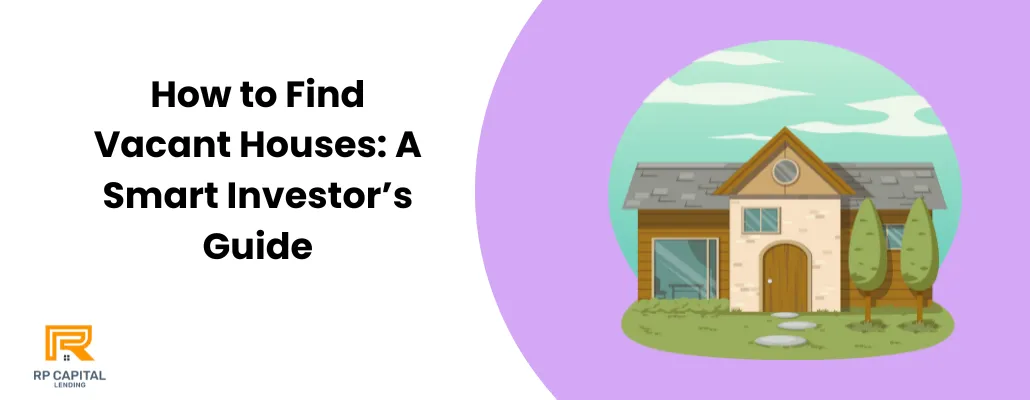Blog

How to Find Vacant Houses: A Smart Investor’s Guide
Vacant properties might not look like much at first glance overgrown lawns, shuttered windows, maybe a few city notices slapped to the front door. But for savvy real estate investors, these homes can represent hidden goldmines. Whether you're looking to fix and flip or finance a rental, locating vacant houses could be your next big move.
At RP Capital Lending, we know that identifying undervalued opportunities is half the battle. This guide will walk you through proven ways to find vacant properties and explain how you can finance them effectively.
Why Vacant Homes Are Worth Your Attention?
Before we dive into the “how,” let’s talk about the “why.” Vacant properties are often:

Below Market Value: Owners of vacant homes may be more motivated to sell, especially if they’re dealing with maintenance issues, unpaid taxes, or long vacancies.
Flexible for Renovation: With no tenants to work around, you’re free to move quickly on renovations and value-add upgrades.
Ideal for BRRRR or Flipping: Vacant homes often need work—perfect for buy-renovate-rent-refinance-repeat (BRRRR) strategies or flipping with financing in place.
Signs a House Might Be Vacant
Spotting a vacant home often starts with your eyes. Look for:
Overgrown grass and landscaping
No window coverings or curtains
Mail overflowing from the mailbox
Notices posted on doors or windows
Boarded-up windows or damaged roofing
No visible utilities in use
These signs suggest a house may be unoccupied—and potentially available for sale.
6 Effective Ways to Find Vacant Properties
If you’re looking to uncover real estate deals with high upside potential, vacant houses are a great place to start. Here’s how experienced and new investors alike are finding them:

1. Drive for Dollars
This hands-on strategy involves cruising through neighborhoods and physically spotting distressed or unoccupied homes. Look for signs like overgrown grass, boarded-up windows, or overflowing mailboxes.
✅ Bonus tip: Use an app like DealMachine to snap photos, tag locations, and instantly pull up ownership details. It streamlines follow-up and marketing to potential sellers.
2. Check Local Property Records
Many counties provide public access to property databases. Search for homes flagged with code violations, unpaid taxes, or probate filings—these are red flags that a home might be vacant or distressed.
➡️ You can often find these databases on your county assessor’s, clerk’s, or tax collector’s website. They’re goldmines for off-market opportunities.
3. Network with Mail Carriers and Delivery Drivers
No one knows a neighborhood better than the people walking or driving it every day. Postal workers and delivery drivers often notice when homes haven’t received mail in weeks or seem unoccupied.
💡 While they can’t share private information, building a relationship with them (even just friendly conversation) may give you valuable intel on which houses are consistently vacant.
4. Use Real Estate Lead Platforms
Platforms like PropStream, BatchLeads, or PropertyRadar allow you to search nationwide for vacant homes based on filters like absentee ownership, equity, mortgage status, and more.
📊 These tools are especially powerful because they combine multiple data sources—saving you time and giving you an edge with accurate, up-to-date info.
5. Check Eviction Records
Properties with recent or pending evictions may soon be sitting empty. These owners—especially tired landlords—may be eager to sell rather than re-tenant.
⚖️ You can find eviction filings through local court websites or third-party legal databases. It’s a proactive way to find leads before they hit the open market.
6. Look on Zillow, Craigslist, or Facebook Marketplace
If a rental listing has been up for a long time with little activity, it might indicate a vacant property. Reach out to the owner or landlord—many are open to off-market offers if they’re tired of the property sitting idle.
📌 Pay attention to listings that are poorly written, have outdated photos, or appear to be reposted frequently. These are often overlooked gems.
Financing Vacant Properties with RP Capital Lending
Vacant properties often require quick funding, especially if you're competing with other investors. That’s where we come in.
At RP Capital Lending, we specialize in loans for:
Rental Property Acquisitions
BRRRR Strategy Financing
We understand the unique risks and rewards of vacant homes. Our underwriting is fast, flexible, and investor-friendly—because we invest in your vision.
Final Thoughts
Vacant houses are everywhere. The challenge isn’t just finding them—it’s knowing what to do once you do. With the right tools, sharp eyes, and a reliable lender by your side, you can turn forgotten homes into flourishing investments.
If you’re ready to act on a vacant property lead or want help securing fast funding, contact RP Capital Lending today. Let’s bring that vacant home back to life—and make it a win for your portfolio.
FAQs About Finding Vacant Houses
1. How can I tell if a property is vacant?
Look for signs like uncut grass, full mailboxes, boarded windows, and no visible activity.
2. Are vacant homes good investments?
Yes—vacant homes often sell below market value and can be great for flips or rental strategies.
3. Can I finance a vacant property?
Absolutely. RP Capital Lending offers fix-and-flip, bridge, and BRRRR-friendly loans for vacant homes.
4. Where can I find vacant property leads online?
Platforms like PropStream, DealMachine, and county public records are great starting points.
5. Do I need to inspect a vacant house before buying?
Yes—an inspection helps reveal hidden issues and protects your investment strategy.
RP Capital Lending is a d.b.a of RP Capital Partners Inc (NMLS # 2469193) | Privacy Policy
Copyright © 2022. All Rights Reserved.
Disclaimer: Loans only apply to non-owner occupied properties. Rates, terms and conditions offered only to qualified borrowers, may vary upon loan product, deal structure, other applicable considerations, and are subject to change at any time without notice.

